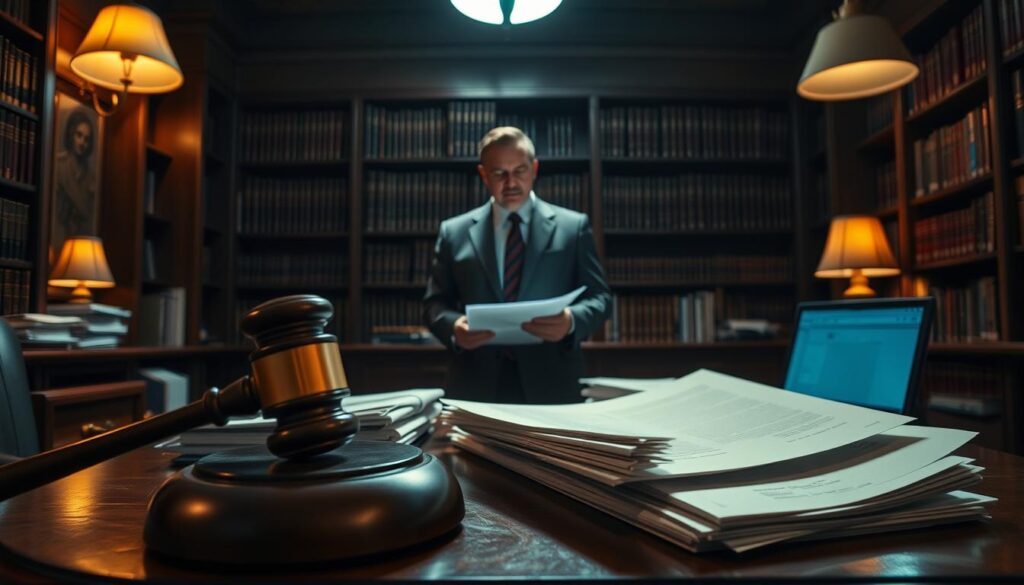Learning about criminal mischief in Texas can help you avoid legal trouble. Texas laws see property damage as a serious crime with big consequences. It’s important for property owners and those worried about legal issues to know about Texas vandalism laws.
Texas Penal Code § 28.03 clearly explains criminal mischief. It shows how intentional damage to property can lead to serious penalties. From small vandalism to big property damage, the law takes these crimes very seriously.
The severity of criminal mischief charges depends on the damage and the situation. Penalties can be small fines or long prison sentences. It’s key to understand the legal risks involved.
Table of Contents
Understanding Criminal Mischief Under Texas Law
Criminal mischief in Texas is a serious legal issue. It involves damaging property in many ways. The Texas Penal Code § 28.03 explains how these crimes are handled. Understanding this can help you deal with property damage charges.
The law says criminal mischief is damaging someone else’s property without their okay. This includes many types of property damage and tampering.
Definition Under Texas Penal Code
According to Texas Penal Code § 28.03, criminal mischief means certain actions that harm or cost money. The main points are:
- Intentionally destroying someone else’s property
- Tampering with property that causes financial loss
- Disrupting public services or utilities
Elements of Criminal Intent
Criminal intent is key in deciding how serious property damage charges are. The law has different levels of intent:
- Knowingly causing damage
- Intentionally destroying property
- Recklessly damaging property
Types of Property Damage Covered
The Texas legal system groups property damage by value and type. This affects the penalties and charges you might face.
Remember, even small acts of property damage can lead to big legal problems.
Damage can be physical, like graffiti or vandalism. It can also include tampering with utilities or messing with personal or public property. Charges can be misdemeanors or felonies, based on the damage and intent.
Common Forms of Criminal Mischief in Texas
Criminal mischief in Texas covers many destructive actions. These can lead to serious legal trouble. Intentionally damaging property can result in charges for defacing or destroying property in Texas.

- Vandalism of vehicles (keying cars)
- Spraying graffiti on public or private property
- Breaking windows of buildings or vehicles
- Damaging school or government property
- Destroying mailboxes
- Egging houses or cars
Texas law views these offenses seriously. The penalties depend on the damage cost. Charges can range from a minor misdemeanor to a serious felony.
| Damage Amount | Offense Level | Potential Punishment |
|---|---|---|
| $99 or less | Class C Misdemeanor | Up to $500 fine |
| $100 to $749 | Class B Misdemeanor | Up to 180 days in jail |
| $2,500 to $30,000 | State Jail Felony | Up to 2 years in jail |
| $300,000 or more | First-Degree Felony | Up to life in prison |
Prosecutors must prove the damage was intentional. Knowing these consequences helps understand the legal risks of criminal mischief in Texas.
Property Damage Classification and Value Thresholds
Understanding criminal mischief in Texas means looking at how property damage is handled. The legal system has a clear way of dealing with these charges. It looks at the total value of the property damaged.
In Texas, the severity of criminal mischief charges depends on the damage’s value. The charges can range from minor misdemeanors to serious felonies.
Misdemeanor Classifications
Criminal mischief can be a misdemeanor in Texas based on the damage’s value. Here are the thresholds:
- Class C Misdemeanor: Damage under $100
- Class B Misdemeanor: Damage between $100 and $750
- Class A Misdemeanor: Damage between $750 and $2,500
Felony Classifications
Malicious mischief becomes a felony when the damage value goes over certain limits:
| Damage Amount | Felony Classification |
|---|---|
| $2,500 – $30,000 | State Jail Felony |
| $30,000 – $150,000 | Third-Degree Felony |
| $150,000 – $300,000 | Second-Degree Felony |
| Over $300,000 | First-Degree Felony |
Special Property Considerations
Some properties get extra penalties. This includes public utilities, government property, or critical infrastructure. These can lead to harsher charges, no matter the damage amount.
The specific value of damaged property is key in criminal mischief charges in Texas.
Legal Consequences of Property Destruction

When you face property damage charges in Texas, the consequences can be severe. Texas vandalism laws have a complex system of penalties. These penalties increase based on the damage and intent.
The legal outcomes of criminal mischief can vary. You might face small fines or even jail time. Knowing these outcomes shows how serious property destruction is.
- Class C Misdemeanor: Damage under $100, typically resulting in a fine
- Class B Misdemeanor: Damage between $100-$750, potential jail time up to 180 days
- Class A Misdemeanor: Damage between $750-$2,500, possible one-year jail sentence
- State Jail Felony: Damage between $2,500-$30,000, potential 180 days to 2 years imprisonment
Your criminal record can have long-term effects. A conviction can limit your job, housing, and professional opportunities.
| Damage Amount | Classification | Potential Penalties |
|---|---|---|
| Under $100 | Class C Misdemeanor | Fine only |
| $100-$2,500 | Class B Misdemeanor | Up to 180 days jail |
| $2,500-$30,000 | State Jail Felony | 180 days to 2 years prison |
| Over $30,000 | First-Degree Felony | 5-99 years imprisonment |
You might also have to pay for the damages. This adds to the financial burden. Talking to a lawyer can help you understand your case and possible defenses.
Graffiti and Vandalism Laws in Texas
Texas has strict laws against graffiti and property damage. These laws aim to protect both public and private spaces. Knowing these laws can help you avoid legal trouble that could affect your future.

Defacing property in Texas is a serious crime. The Texas Penal Code outlines what is considered illegal marking and the penalties for it.
Types of Prohibited Markings
There are several types of markings that are illegal in Texas:
- Paint spray applications
- Indelible marker drawings
- Etching or scratching surfaces
- Unauthorized tagging of public or private property
Special Location Considerations
Some places have harsher penalties for graffiti and vandalism. These include:
- Schools and educational institutions
- Places of worship
- Government buildings
- Historic landmarks
Enhanced Penalties for Protected Properties
Defacing property in these areas leads to more severe penalties. Vandalism charges can go from misdemeanors to felonies, based on the location and damage.
The average cost of graffiti removal ranges from $1,000 to $5,000 per incident in Texas.
Potential penalties for graffiti and vandalism include:
- Fines ranging from $500 to $10,000
- Probation periods from 6 months to 10 years
- Community service requirements of 40 to 400 hours
- Potential criminal record implications
Criminal Mischief Involving Public Utilities
Damaging public utilities in Texas is a serious crime. It can lead to harsh legal penalties. This crime is more than just property damage. It involves critical systems that are vital to society.
Interfering with utilities like water, power, or communication can lead to big legal problems. In Texas, such actions are considered a third-degree felony. This can mean big fines and even jail time.
- Tampering with utility lines can trigger immediate legal action
- Damage to public infrastructure may result in felony charges
- Potential penalties include hefty fines and years of incarceration
The effects of damaging utilities in Texas go beyond legal trouble. You might also face financial penalties from the utility companies. You could be required to pay back the full cost of the damage.
Texas takes protection of public utilities extremely seriously, with laws designed to prevent and punish intentional infrastructure damage.
As of September 2023, Texas has strict rules for public utilities. Local governments must report security incidents within 48 hours. This shows Texas’s dedication to keeping its infrastructure safe from harm.
If you’re facing charges for damaging public utilities in Texas, getting a lawyer right away is key. They can help you understand your rights and possible defense options.
Defense Strategies Against Criminal Mischief Charges
When you face criminal mischief charges in Texas, knowing your legal options is key. The laws on vandalism in Texas offer ways to fight property damage accusations. Your defense strategy can greatly affect the outcome of your case.
Handling criminal charges needs a detailed plan based on your case’s specifics. Skilled lawyers can craft defense strategies that question the prosecution’s evidence and story.
Common Legal Defenses
There are several defense strategies for criminal mischief in Texas cases:
- Lack of intent: Showing you didn’t mean to damage the property
- Property owner’s consent: Proving you had permission to touch the property
- Mistake of fact: Arguing you didn’t understand the situation
- Mistaken identity: Questioning the evidence that links you to the damage
Mitigating Factors
Some factors might lessen the severity of criminal mischief in Texas charges:
- No criminal history
- Little property damage
- Offering to pay for the damage
- Showing you’re truly sorry
Burden of Proof Requirements
“The prosecution must prove beyond a reasonable doubt that you intentionally and knowingly caused damage to property without consent.”
In Texas, the prosecution must prove everything. Your lawyer can question the evidence by looking at:
- Witness reliability
- Physical evidence quality
- Other possible explanations
- Errors in collecting evidence
Every criminal mischief case is different. Talking to a skilled criminal defense lawyer who knows Texas law well is crucial. They can create the best defense for your situation.
Impact on Criminal Record and Future Implications
A criminal mischief conviction in Texas can lead to lasting challenges. It affects many areas of your life, both personal and professional. Your criminal record can block many doors.
Property damage charges can hurt your future chances. Employers, landlords, and schools often check your background. They might see your criminal history.
- Employment prospects become severely restricted
- Professional licensing may be jeopardized
- Housing applications can be denied
- Educational opportunities might be limited
A criminal mischief in Texas conviction can hurt your career. Medical, teaching, and finance careers often have strict rules about criminal records. A conviction might:
- Suspend your professional licenses
- Require you to report to agencies
- Make you ineligible for certain careers
But, there are ways to lessen these effects. Talking to a lawyer about sealing or expunging your record might help. This could reduce the harm from a criminal mischief charge in Texas.
Proactively addressing your criminal record can significantly improve your future opportunities and professional prospects.
Restitution and Civil Liability Considerations
When you face property damage charges in Texas, think about more than just criminal penalties. Restitution is a big deal and can really affect your money future.
Courts take property damage very seriously. They might ask you to pay back victims for their losses. This means you’ll have to cover more than just the cost to fix things.
Calculating Damage Costs
When figuring out damage costs, you’ll need to consider:
- Direct repair expenses
- Costs to replace damaged items
- What it takes to restore things
- Any indirect economic losses
Payment Requirements and Terms
In Texas, there are rules for paying back damages. You might have to pay in installments or all at once, depending on how bad the damage was.
A judge can order you to pay back no more than the fine for the crime.
If you don’t pay back what you owe, you could face serious problems. This includes:
- Probation violations
- More legal penalties
- Contempt of court charges
- It could hurt your chances in future legal cases
Also, remember that you might have to deal with civil lawsuits on top of criminal charges. This means you could face even more financial trouble after your criminal case is over.
Special Circumstances and Enhanced Penalties
In Texas, not all property damage is the same. The Texas Penal Code 28.03 outlines special rules for harsher penalties. These rules apply to certain situations.
Some special circumstances that lead to harsher charges include:
- Damage to places of worship
- Vandalism of public schools
- Destruction of community monuments
- Targeting historic landmarks
These harsher penalties show Texas’s dedication to protecting important places. If you damage these types of property, you could face more severe legal consequences than usual.
Texas law recognizes that some property has greater social significance and deserves additional legal protection.
The severity of penalties can change a lot based on the property type. For example, damaging a public school might lead to a higher misdemeanor or even a felony charge. This is different from damaging private property.
It’s important to understand these legal differences. Repeat offenders or those who intentionally cause damage face even harsher penalties under Texas law.
Role of Law Enforcement and Prosecution
In Texas, law enforcement and prosecutors are key in dealing with criminal mischief. They start by collecting evidence and figuring out the best legal steps. This is to handle property damage charges effectively.
Law enforcement officers follow several important steps to investigate criminal mischief:
- Documenting the extent of property damage
- Collecting physical evidence from the crime scene
- Interviewing potential witnesses
- Reviewing surveillance footage
- Analyzing forensic evidence
Prosecutors in Texas look at several factors when reviewing criminal mischief cases:
- Total value of property damage
- Intentionality of the destructive act
- Criminal history of the suspect
- Potential mitigating circumstances
The severity of property damage charges can greatly affect the legal outcome. In Texas, the damage amount determines if a case is a misdemeanor or felony.
| Damage Value | Classification | Potential Penalty |
|---|---|---|
| Under $100 | Class C Misdemeanor | Fine up to $500 |
| $100-$750 | Class B Misdemeanor | Jail time up to 180 days |
| $750-$2,500 | Class A Misdemeanor | Jail time up to 1 year |
| Over $2,500 | Felony | Potential prison sentence |
Knowing how criminal mischief cases are handled in Texas is important. It shows the seriousness of property damage charges. It also highlights the thorough investigation by law enforcement.
Steps to Take When Charged with Criminal Mischief
Facing criminal mischief charges in Texas can be overwhelming and stressful. Knowing the right steps can greatly affect your case’s outcome. Texas’s vandalism laws are complex and need careful handling.
When you’re charged with criminal mischief in Texas, acting quickly is key. Here are the essential steps to follow:
- Remain Silent: Use your right to avoid saying anything that could hurt you
- Document Everything: Keep all evidence from the incident safe
- Contact an Attorney Immediately: Get legal advice right away
- Avoid Discussing the Case: Only talk about it with your lawyer
Immediate Legal Considerations
The seriousness of criminal mischief charges depends on the damage’s value. Texas has different levels for these offenses:
| Damage Value | Classification | Potential Consequences |
|---|---|---|
| Under $100 | Class C Misdemeanor | Fine up to $500 |
| $100 – $750 | Class B Misdemeanor | Up to 180 days jail, $2,000 fine |
| $750 – $2,500 | Class A Misdemeanor | Up to 1 year jail, $4,000 fine |
Legal Representation Options
Choosing the right lawyer is crucial for your case. You have several options:
- Public Defender: A court-appointed lawyer who doesn’t cost you directly
- Private Criminal Defense Attorney: A lawyer with deep knowledge of Texas’s laws
- Legal Aid Organizations: They offer low-cost or free legal help
“The right legal representation can mean the difference between a conviction and a favorable resolution.” – Texas Criminal Defense Attorneys Association
Acting quickly and making informed choices is your best defense against criminal mischief charges in Texas.
Conclusion
Criminal mischief in Texas is a serious issue that can affect your future a lot. Property damage charges have big consequences that go beyond just penalties. It’s important to know the legal side of criminal mischief in Texas to protect your rights and avoid bad outcomes.
When you face property damage charges, the situation is serious. The Texas legal system treats these offenses very seriously. The outcome can range from a misdemeanor to a felony, depending on your actions and the damage done.
To protect yourself, taking action early is key. If you’re in a criminal mischief situation, getting a good lawyer is crucial. A skilled attorney can help you through the legal system. They might reduce your charges or find ways to lessen the impact on your life.
The best way to avoid trouble is to prevent it. Knowing Texas laws about property damage and respecting others’ property can help. Being aware and responsible can keep you out of legal trouble and protect your record.

